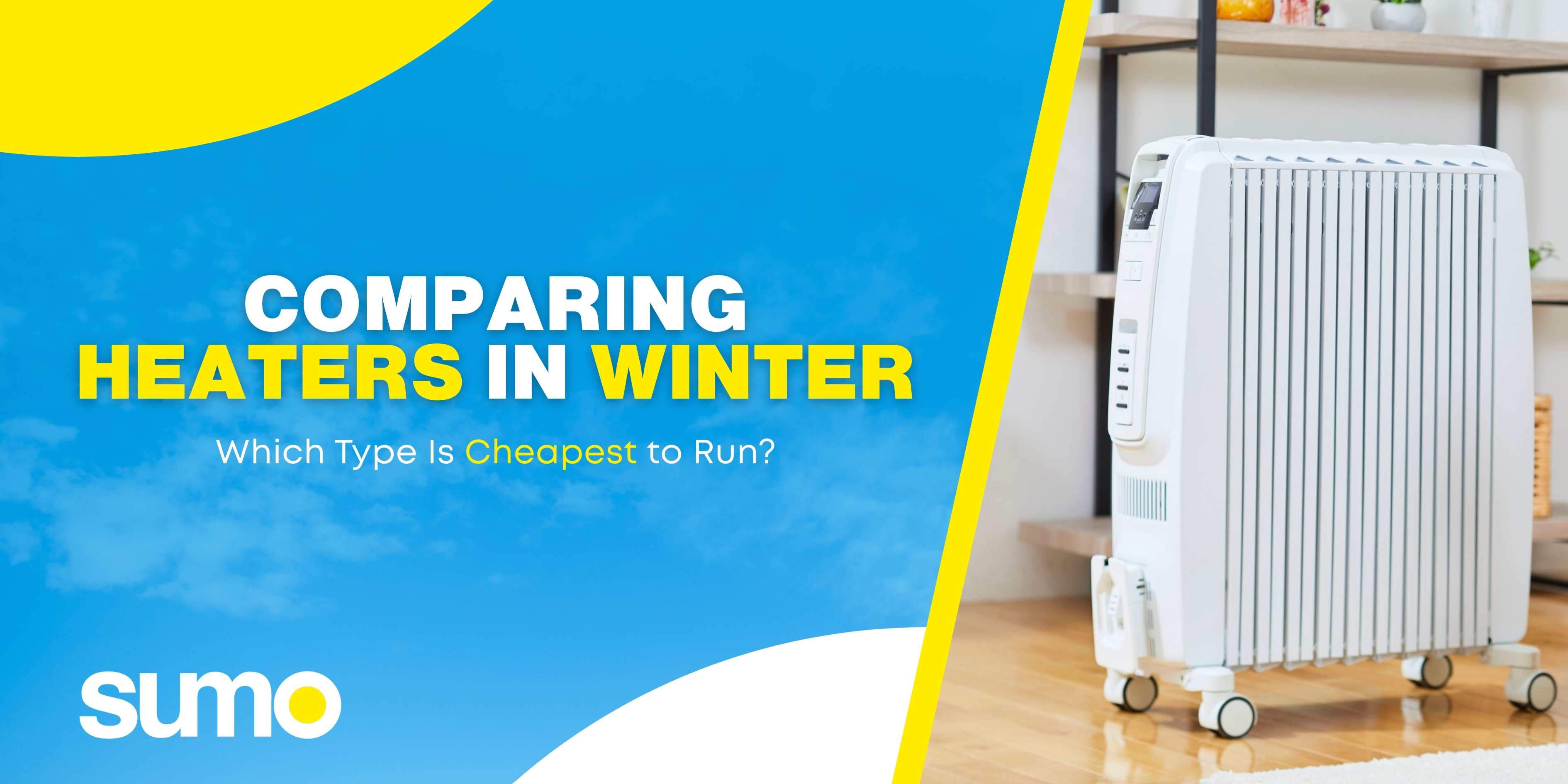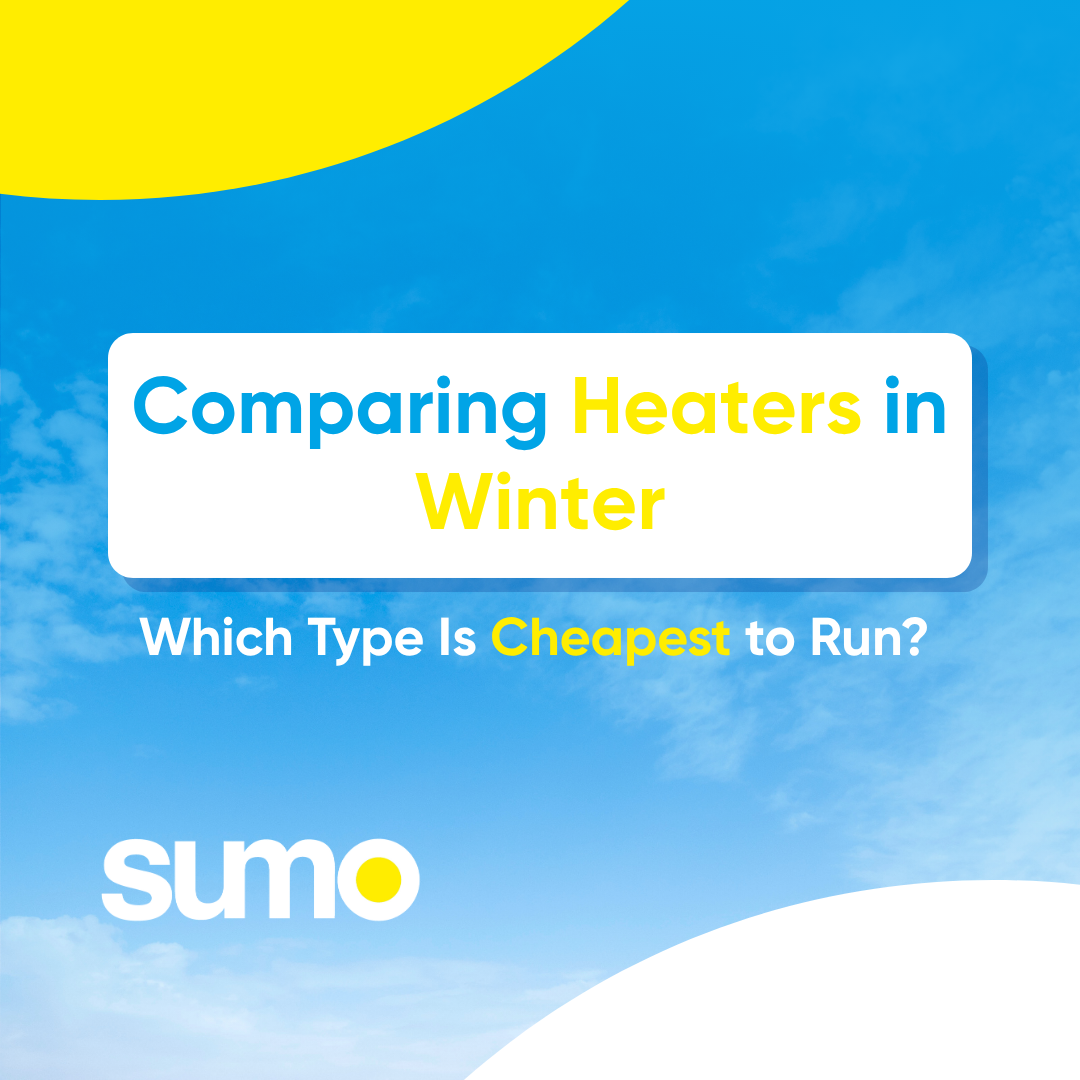Winter isn’t just about digging out your warmest socks and bingeing your favourite series under a doona. It’s also when your heating bills start creeping up. And let’s be honest, no one wants to feel the chill and the financial sting. So, what’s the cheapest way to stay toasty? Let’s break down the best heater options to help you stay warm without breaking the bank.
In this guide, we’ll learn why:
• The reverse-cycle air conditioner is the cheapest electric heater to run
• Running costs vary so much between heater types
• More than $100 on the energy bill you can save by choosing a more efficient heater

Gas heaters
To estimate how much gas heating could add to your energy bill over winter, we’ve based the calculation on using a gas heater for 3 hours a day over a 90-day winter period.
These figures also assume an annual gas usage of 24,900 Megajoules (MJ), helping to illustrate the cost differences based on room size and location.
| Room Size | Heating Capacity | Avg Gas Use per Hour (MJ) | Total Usage (MJ) | Brisbane | Sydney | Melbourne |
| Small | 2.9–4.2kW | 15 | 4,050 | $211 | $149 | $146 |
| Medium | 3.4–6.6kW | 20 | 5,400 | $281 | $199 | $194 |
| Large | 5.2–8.2kW | 25 | 6,750 | $351 | $249 | $243 |
Gas heater running costs Comparison ( Canstar)
Winter gas heating costs can range from around $146 to over $350, depending on room size and your location. In Melbourne, gas remains cost-effective, especially for heating medium to large spaces
Which Type of Electric Heater Is Cheapest to Run?
If you use heating regularly, it’s worth considering high-efficiency electric options. Not all heaters cost the same, so here’s a quick comparison to help you choose the best type for your space, usage, and budget.
Heater Type | Avg. Power Use | Melbourne | Sydney | Brisbane | Best For |
| Radiant bar heater | 2.1 kWh/hr | $137/winter | $191 | $183 | Quick heat in small rooms (short use) |
| Fan heater | 2.1 kWh/hr | $137/winter | $191 | $183 | Occasional use in small rooms |
| Oil column heater | 1.8 kWh/hr | $117/winter | $164 | $157 | Gentle, steady heat in medium rooms |
| Ceramic heater | 1.8 kWh/hr | $117/winter | $164 | $157 | Energy-efficient small-to-medium rooms |
| Panel/convection | 2.1 kWh/hr | $137/winter | $191 | $183 | Background heating for bedrooms/living |
| Reverse cycle air-con | ~0.6–0.8 kWh/hr | ~$50–$70 | ~$70-$90 | ~$65–$85 | Best for daily use in med-large rooms |
Electric heater running costs Comparison ( Canstar)
Tip:
• Electric fan heaters are inexpensive to buy, but they are usually the most expensive to operate. A reverse-cycle air conditioner is one of the most efficient and cost-effective options for daily use.
• Oil column heaters: Most oil heaters include a built-in thermostat, which lets them cycle off automatically once the room reaches the set temperature and back on as it cools. Thanks to the stored heat in the oil, they don’t need to run at full power the whole time, making them feel more efficient for longer use. If your model only has basic heat settings, you may need to switch it on and off manually during the night, or use a timer to save energy while keeping the room comfortable (source). For example, some people prefer to run the heater from 8pm to 11pm to warm up the room, switch it off while sleeping, then turn it back on at 2am or 5am when the temperature drops again.
How to Calculate Heater Running Costs
Want to know how much your current heater is costing you? Here’s how to work it out:
1. Find the heater’s input power
Look for a label or manual that tells you the energy requirement. This is often shown in kilowatts (kW) for electric heaters or megajoules (MJ) for gas heaters.
2. Check your energy usage rate
Grab your latest energy bill to find the rate you’re being charged per kWh (electricity) or MJ (gas). Look this up on your retailer’s energy price
3. Do the maths
Use this simple formula: Running cost = Energy usage x Usage rate
Example (Electric heater):
A 2kW electric fan heater used with an energy rate of 30c/kWh:
2kWh × 30c = 60 cents per hour
Example (Gas heater):
A 20MJ/h portable gas heater with a gas rate of 3c/MJ:
20MJ × 3c = 60 cents per hour
Tips: Some heaters with thermostats, timers, or energy-saving modes may consume less energy overall.
How Much Can You Save by Using a More Efficient Heater?
Choosing an efficient heater can cut your heating bills significantly throughout winter.
Here’s a simple example comparison:
Heater Type | Cost per hour | 5 hrs/day for 90 days | Estimated Winter Cost |
| Electric fan heater (2kW) | 60c | 5 × 90 = 450 hrs | $270 |
| Reverse cycle air conditioner | 35c | 5 × 90 = 450 hrs | $157.50 |
Want to learn how to read the energy rating label and choose the right heater? Click here
Need more energy-saving tips? Click here.
Choosing the right heater really depends on your usage needs. Whether you’re heating a small room occasionally or keeping a larger space warm every day. But with energy prices on the rise, it’s well worth comparing your options to find the most efficient and cost-effective solution for your home.
Not sure if you're getting the best energy deal?
Enter your postcode below to see how much you could save on your energy bill.

No Comments Yet